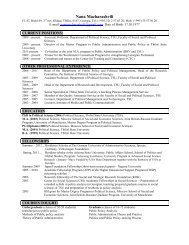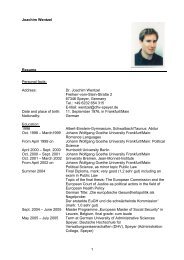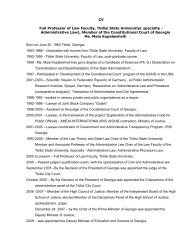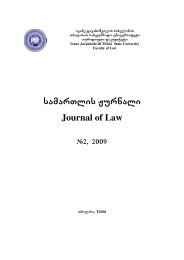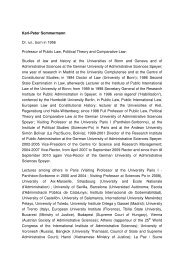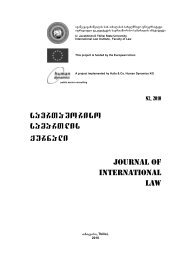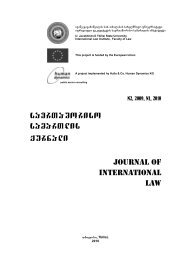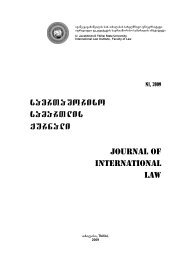Untitled
Untitled
Untitled
You also want an ePaper? Increase the reach of your titles
YUMPU automatically turns print PDFs into web optimized ePapers that Google loves.
saerTaSoriso samarTlis Jurnali, #1, 2008 JOURNAL OF INTERNATIONAL LAW, N1, 2008<br />
The system for the rehabilitation of juvenile<br />
offenders should ensure the following:<br />
1. availability of Non-residential programmes,<br />
including guidance and supervision, probation,<br />
community service, compensation and<br />
restitution to the victim and group counselling;<br />
2.Residential facilities should be small enough<br />
to facilitate individual treatment, and be decentralized<br />
so as to permit juveniles to receive<br />
treatment near their community; 3. availability<br />
of residential rehabilitation programmes involving<br />
education, counselling, vocational<br />
training and recreation, adapted to the needs<br />
of the different types of offenders, in cooperation<br />
with community-based services and programmes<br />
when possible; 4. isolation from the<br />
community should be no greater than necessary,<br />
and contact between the residents and<br />
their families should be encouraged and facilitated,<br />
unless it would be contrary to the interests<br />
of the child; 5. Effective, independent<br />
mechanisms established to investigate complaints<br />
against law enforcement agencies or<br />
officials alleging violations of the rights of the<br />
child.<br />
INTERNATIONAL INSTRUMENTS<br />
Involvement with juvenile justice systems<br />
is a reality for a great number of children and<br />
adolescents. Addressing this growing concern,<br />
the United Nations has adopted a number of<br />
international instruments directly dealing with<br />
children’s rights and juvenile delinquency.<br />
The most important instrument for juvenile<br />
justice is the UNCRC ( specifically articles<br />
37, 39, 40) supported by the UN Minimum Standards<br />
and Norms in Juvenile Justice. The minimum<br />
standards are made up of the United<br />
Nations Standard Minimum Rules for the Administration<br />
of Juvenile Justice (the ‘Beijing<br />
Rules’), the United Nations Guidelines on the<br />
Prevention of Delinquency (the ‘Riyadh Guidelines’)<br />
and the United Nations Rules on the<br />
Protection of Juveniles Deprived of Liberty.<br />
The UN Minimum Rules for the protection of<br />
Juveniles deprived of their Liberty (Havana<br />
Rules) and the more recent Vienna Guidelines<br />
for action on Children in Criminal Justice System.<br />
The UN minimum standards and Norms<br />
supplement expand and support the provisions<br />
in the UNCRC. Although guidelines are<br />
not binding for Georgia directly, “together they<br />
constitute a comprehensive set of universal<br />
standards and set out desirable practices to<br />
be pursued by the world community.<br />
The UNCRC makes it clear that the inherent<br />
special needs and vulnerability of children<br />
must be taken into account in the implementation<br />
and development of laws on juvenile justice.<br />
The primary goal of a juvenile justice system<br />
should not be that of punishment for the<br />
crime, but rehabilitation and reintegration of the<br />
juvenile.<br />
International instruments setting out standards<br />
and containing guidelines for administration<br />
of juvenile justice have existed for several<br />
decades. However the rights, norms and<br />
principles involved are regularly ignored, extensively<br />
disregarded and sometimes also<br />
seriously violated. Despite the fact, that all<br />
state parties to the UNCRC (even with transitional<br />
or week economies) are obliged to “allocate<br />
the maximum extent of its available resources<br />
for the implementation of the Convention<br />
and priority give to children.” 2 The challenge<br />
nowadays is to transform the universal<br />
acceptance of children’s rights into universal<br />
observance of these rights.<br />
I. Un Convention on the Rights of the<br />
Child: The UNCRC (1989) – The Convention<br />
on the Rights of the Child is the first international<br />
instrument to adopt a coherent child rights<br />
approach to the international legal regulation<br />
of the deprivation of liberty of children. The<br />
most specific articles of the CRC in relation to<br />
juvenile justice are Art. 37 & 40. Article 37(1)<br />
of the Convention on the rights of the Child<br />
specifically protects children deprived of their<br />
liberty from violations of their due process and<br />
personal integrity rights. It:<br />
• prohibits torture, cruel, inhuman, degrading<br />
treatment or punishment, capital punishment<br />
and life imprisonment, arbitrary or<br />
illegal arrest, detention or imprisonment;<br />
• stipulates that arrest and detention shall<br />
only be used as a last resort and for the<br />
shortest appropriate period of time; and<br />
• describes the right of children deprived of<br />
their liberty to be treated with humanity,<br />
respect and dignity in a manner that takes<br />
into account their age, to be separated from<br />
adults, to maintain family contact, to have<br />
prompt access to legal and other assistance,<br />
to challenge the legality of their<br />
detention and to expect a prompt decision<br />
in relation to any resulting action.<br />
168



